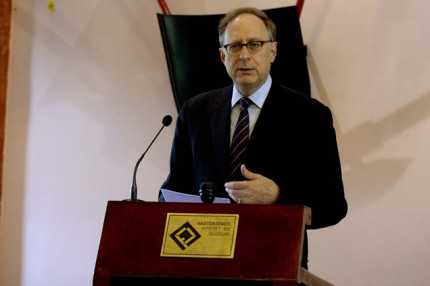Alexander Vershbow: Putin Would Restore Russian Influence in Eastern Europe
Szöveg: honvedelem.hu / MTI | 2015. május 22. 14:40Russian President Vladimir Putin is seeking to restore Russian influence in Eastern Europe, the NATO Deputy Secretary General said in Budapest on Monday, May 18.
NATO’s partners are facing a serious threat. Under these circumstances, transatlantic solidarity is especially important, the American diplomat said at the conference held in the building of the MoD Institute and Museum of Military History. He said that we must demonstrate that we will defend every ally against any threat – whether from the East or the South. He noted that Hungary’s decision to send troops to Iraq and Estonia’s troop contribution to the Central African Republic are examples of solidarity. He stated that strengthening the Alliance is the most effective way of taking action against Russia. For Hungary, NATO membership is the most important guarantee of security, he added.
He reminded his audience that NATO had been striving to establish a wide-ranging cooperation with Russia for more than 20 years. The Alliance succeeded in stabilizing Bosnia and Kosovo, and cooperated with the Russian government in the Council of Europe and the fight against terrorism. He went on saying that five years ago, Russian President Dmitry Medvedev attended the NATO Summit in Lisbon.

Today, the relationship has reached an all-time low, and the xenophobic nationalist Russian propaganda is attempting to convince people that NATO and the United States want confrontation with Russia and try to weaken and destabilize it, the NATO Deputy Secretary General said.
He noted that in answer to the Russian threat, NATO has reinforced its presence in the Baltic Sea and in last September, an agreement was reached on a very high readiness joint task force which is deployable in 48 hours with air and sea support, as well as on the cooperation in stepping up intelligence sharing.
Speaking about the political agenda, Alexander Vershbow said that a comprehensive strategy is needed to make sure that the countries between NATO and Russia can preserve their sovereignty. We need to find a way to help Ukraine and the stability of Russia’s other neighbors, the American diplomat added. He stated that NATO and the European Union must strengthen cooperation in order to be able to better resist Russian disinformation. The next EU summit and the NATO Summit to be held in Warsaw in 2016 will provide good opportunities for this, he noted.
Alexander Vershbow pointed out that security does not come free, strong commitment must also come in the form of resources. Allied governments must meet the defence spending pledge that they made at the NATO Summit in Wales last September.
After the keynote address, in answering a question from the audience as to the Alliance is satisfied with the Hungarian commitment, the Deputy Secretary General said that Hungary is continuously contributing to NATO’s efforts, for example with the Pápa Air Base hosting the C–17 cargo aircraft and with its participation in the Baltic Air Policing mission. Hungary is performing very well in the current tasks, he said, adding that the only concerns are about defence expenditures. We hope that they will approach 2 per cent of the GDP, he noted.
Speaking at the conference, former Foreign Minister János Martonyi stated that there is a new reality in security policy, one that we thought we are already over it. He said NATO must be ready to take action against threats from the east and the south. To this end, a stronger unity is required in NATO and the European Union, and the cooperation between NATO and the EU must be improved, he said.
Photo: Noémi Bruzák (MTI)